-

新人教版高中英语必修3Unit 4 Space Exploration-Reading For Writing教学设计一
另一方面,其余的人反对这个计划,因为它可能会导致一些不好的影响。7.I hold the belief that space exploration not only enable us to understand how the universe began but also help us survived well into the future.我坚信探索太空不仅能够使我们了解宇宙的起源而且能够帮助我们更好地走进未来。8.I think we should spend more time and money exploring space so as to provide new and better solutions to people's shortterm and longterm problems.为了给人类的短期和长期问题提供更新和更好的解决方法,我认为我们应该花更多的时间和金钱来探索太空。9.From my point of view,it is wrong of young people to depend on their telephones too much,which may do harm to both their physical and mental health.在我看来,年轻人过度依赖手机是不对的,因为它们可能会对他们的身心健康都有害。最近你班同学就“人类是否应该进行宇宙探索”这个问题进行了激烈的讨论。有人认为,探索宇宙不仅让人类更好地了解宇宙的发展,还可以用来指导农业生产,以及把一些探索太空的高新技术用于现实生活;也有一些人认为探索太空花掉了大量的人力物力;影响了人们的生活水平。请你根据以下情况写一篇报告并发表自己的观点。注意:1.写作内容应包括以上全部要点,可适当发挥,使上下文连贯;

新人教版高中英语必修3Unit 5 The Value of Money- Discovering Useful Structure教学设计
Step 3 Meaning1. 过去将来时表示从过去某一时间来看将要发生的动作或存在的状态, 常用在宾语从句中。一般由“would/should +动词原形”构成。She hoped that they would meet again someday. 她希望将来有一天他们能再见面。2. was/were going to+动词原形: 表示过去将要发生或很有可能发生的动作, 常用于口语中, 表示预言、意图或者打算等。He was going to start work the following week. 他打算下星期开始工作。3. was/were about to do: 常用来表示即将发生的动作, “刚要/正要做……”。注意该结构不与任何时间状语连用。I felt that something terrible was about to happen. 我感到某种可怕的事情即将发生。4.was/were to do: 表示“曾计划做某事”, 如果表示“本来计划做某事, 动作没实现”, 则需用 “was/were to have done”。She said she was to have told me about the accident. 她说她本来想告诉我关于事故的事。5.Start, go, come, leave, see, meet等动词的过去进行时: 表示就过去某一时刻而言即将发生的动作。She was coming later. 她随后就来。I had just put on my overcoat and was leaving to visit a friend of mine. 我刚穿上外套要去看我的一个朋友。

新人教版高中英语必修3Unit 5 The Value of Money-Listening &Speaking&Talking教学设计
4. A:We’d like to have someone to say a word at the beginning to welcome the group.B:↙Who?A:We thought that you or Dr.Johnson might do it.B用降调说Who,其意思是问,对方想让谁在开场时致欢迎词。Step 6 Pronunciation---Practice1. Listen to the short conversation and mark the intonation with ↗, ↙ or ↙, ↗. Then discuss with a partner what they intend to convey by using different intonation.Owner: You know what ?↗ It’s a million-pound bank note↙.Waiter 1: Really ?↗(question)Waiter 2: Really !↙(unbelievable and surprised)Waiter 3: Really ?!↙↗(first question then surprised)2. Listen to the conversations. Underline the parts that are stressed and mark the intonation. Then talk about the implied meanings of the responses with different intonations. Listen again and repeat.1) Henry: It’s a nice suit.Owner: Oh, it’s perfect!↙(The intonation means it is very suitable for Henry.)2) Henry: Well, that’s very kind of you.Owner: Kind, sir ?↗(what you said is not right) No, it’s kind of you. You must come whenever you want and have whatever you like. Just having you sit here is a great honour !!↙(welcome you to come again)3)Henry:Well, to be honest, I have none. Oliver:(happily) What luck!(excited) Brother↗, what luck!↙(It means “Didn’t you hear it?”)Henry: Well, it may seem lucky to you but not to me!↗(angry) If this is your idea of some kind of joke, I don’t think it’s very funny. Now if you’ll excuse me, I ought to be on my way.↙(If so, I would leave.)Roderick: Please don’t go↙...(hope Henry can wait for a moment)Part B Viewing and Talking---Describe people’s changing attitudes in a film clipStep 1 Before-listening---Tell the filmYou are going to watch part of the film The Million Pound Bank Note. Look at these photos and guess what happens in the film.

新人教版高中英语必修3Unit 5 The Value of Money-Listening &Speaking教学设计
Step 4: Listen again and decide if the following statements are true (T) or false (F).1 It was the first time Chen Liyan's story was reported. T口 F口2 Chen found 10,000 yuan in a small plastic bag in Taiyuan railway station口 F口3 Wang Zheng apologized to Chen because he couldn't offer her more money. T口 F口4 Chen took out a large loan to cure her daughter, T口 F口5 Wang set up a fundraising website for Chen's daughter after Chen told him about her situation. T口 F口Step 5:After listening, discuss the questions.1 What kind of person do you think Chen Liyan is?Chen Liyan is generous and honest because she returned a large sum of money to the owner.2 Did Chen return the money because she didn't need it?No. She returned the money because it was the right thing to do. Evidence for this is that she refused to accept the reward money because she felt that it had not been earned. 3 Is it common for people to do what Chen did?It depends on the culture. In some countries it is quite common to return money that has been found. In other countries, people believe "Finders are keepers!" 4 How did Wang Zheng feel about the return of his money?He must have been very happy and relieved to have gotten his money back. We know this because he thanked Chen repeatedly and even offered her a reward.5 Why did Ma Dongbao tell Wang about Chen's family?He must have had great sympathy for Chen and her daughter and wanted to help them.'We know this because he arranged help for them. 6 How did the news reporter feel about Chen's actions?The news reporter felt that it showed that money wasn't the most important thing in life. We know this because the reporter told us that this is what Chen believes. and then said, “that's a great attitude to take."

新人教版高中英语必修3Unit 5 The value of money-Reading and Thinking教学设计二
? Could you offer me some kind of work here?? I don’t want your charity, I just want an honest job.? Careless: I landed in Britain by accident.Step 7:Consolidation.? Find Henry? Roderick and Oliver were I .making a bet when they saw Henry, a poor young man. ? Know Henry? About a month ago, Henry was sailing and later he found himself carried out to sea by a strong wind. Fortunately, he 2.was spotted by a ship. And it was the ship that brought him to 3.England? Offer money to Henry ? Oliver and Roderick gave Henry a letter and told him that there was money in it. They 4.persuaded him to accept it, and made him 5.promise that it wouldn't be opened until 2 o'clock.Step 8:Language pointsa large amount of: a large quantity of; a great deal ofe.g. They bought a large amount of furniture before they moved their new house.make a bet: make an arrangement to risk money, etc. on an event of which the result is doubtful.e.g. We made a bet on the result of the match.permit sb to do something: allow somebody to do somethinge.g. My mother doesn’t permit me to ride in the street after it rained.by accident: as a result of chancee.g. I only found it by accident.stare at: look at somebody or something with the eyes wide open in a fixed gaze( in astonishment, wonder, fear, etc)to be honest: to tell you the truth; to be franke.g. To be honest, I don’t think we have a chance of winning.Step7 Homework:What do you think will happen to Henry? Will the bank-note help him or get him into trouble?

新人教版高中英语必修3Unit 5 The Value of Money-Reading and Thinking教学设计一
Everybody wants to get wealth.In today’s material world,making money or becoming wealthy symbolizes a person’s success and capability. Many people just make every effort, pay any price to attain greater wealth. With money,they can buy nice, large apartments in nice neighborhood. With money they can own luxurious cars. Wealth seems to bring all happiness in life.But is wealth the only road to happiness? Not really. There are many things in the world, which are beyond the means of money, such as friendship, love, health and knowledge. People are so preoccupied with struggling for money that they have no time or would not take the time to form or maintain friendship. What happiness can they feel living as lonely miserable creatures without love or friends in the world even if they accumulate tremendous wealth?In my opinion, people can’t do anything without money, but money is not everything. What money will bring you depends on your personal belief and goal in life. If you are kind enough to help others, especially the poor, money is a good thing to you. With it, you can do much more for the benefit of people and your country, and it will add to your own happiness. If you want money just for your own needs, you’ll never be satisfied or happy. In a word,you should have money spent for more people. Only then can money be the source of your happiness.Step 8 Homework4 students in a group, one acts Roderick, one Oliver, one servant and the fourth one acts Henry Adams, then listen to the tape, pay more attention to the difference between American English and British English in pronunciation, stress, tone.

新人教版高中英语必修3Unit 5 The Value of Money-Reading for Writing教学设计二
2. 您能看到, 我头发太长了。You can see that my hair is much too long.3. 无论什么时候, 只要您想回来就回来。Please come back whenever you want.4. 您仅有很少的头发要理! You only have too little hair to cut !5. 为您服务是我的荣幸!It is my honour to serve you!Step 9 Writing(Henry is walking down the street when he sees a sign for a place that cuts hair. He decides to have it cut. )H=Henry B=BarberH: Good afternoon, I’d like to have my hair cut, if I may. (The barber looks at Henry’s hair and continues cutting another man’s hair. ) Er, I’d really like a haircut. As you can see it’s much too long. B: (in a rude manner) Yes, I can see that. Indeed, I can. H: Fine, well, I’ll have a seat then. (He sits in one of the barber’s chairs. The barber turns to look at Henry. )B: It’s quite expensive here, you know! Are you sure you can afford it?H: Yes. I think so. (After his hair is cut, the barber tells Henry how much he must pay. Henry shows the barber the bank note. )B: Why Mr. . . (looks shocked)H: Adams. Henry Adams. I’m sorry. I don’t have any change. B: Please don’t worry! (wearing a big smile) Nothing to worry about! Nothing at all! Please come back whenever you want, even if you only have too little hair to cut! It will be my honour to serve you!Step 10 Pair workExchange drafts with a partner. Use this checklist to help your partner revise his/her draft.1. Are all the elements of a play included and in good order ?2. Do the character use suitable language ?3. Are the stage directions clear and useful ?4. Is the plot clear and exciting enough ?
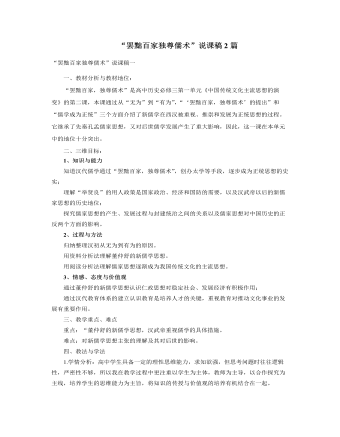
人教版高中历史必修3“罢黜百家独尊儒术”说课稿2篇
1、汉武帝尊儒的措施:(1)政治方面:起用很多儒学家参与国家大政。他规定,地方定期选出孝子、廉吏当中央任官,甚至还擢升平民、儒士为相。这明显扩大了官员的队伍,提高了官员的文化素质,巩固了封建统治基础,成为汉武帝文治武功的重要组成部分。也给后世封建王朝在用人方式方法上面提供了宝贵的借鉴和启迪。(2)思想方面:采纳董仲舒的建议,“罢黜百家 独尊儒术”(3)教育方面:儒家经典“五经”为国家规定的教科书。兴办太学和设立地方学校进行儒学教育。公元前136年,汉武帝正式规定《诗》、《书》、《礼》、《易》、《春秋》为“五经”;前124年,又在长安兴办太学,规定太学生员为博士弟子,一律由儒家五经博士负责教授,学完经考试合格后即可到政府任官。这是封建国家利用政权的力量兴办教育、提倡儒学,其必然对整个社会的教育事业有一定的导向作用。
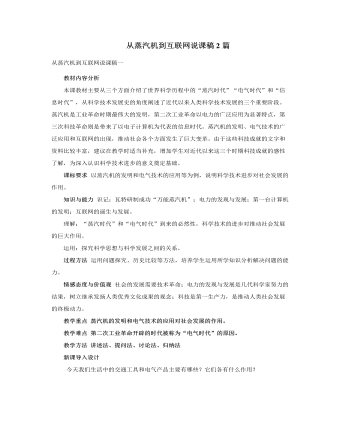
人教版高中历史必修3从蒸汽机到互联网说课稿2篇
2、互联网的功用:(1)功用:提供文件传输、电子信箱、聊天等服务,在社会各个领域发挥了巨大的作用,标志着信息化社会的出现。(2)特点:网络媒体作为一种新的传播媒体,具有界面直观、音色兼备、链接灵活和高速传输的特点。3、互联网的影响:教师提问,学生思考回答,教师总结 (1)信息经济在世界各地全面发展,加快了经济全球化的步伐;(2)传统产业也借助互联网提高管理水平,并通过全球营销和采购扩大市场;(3)在互联网时代,人们可以在家里完成很多工作,提高了工作效率,增加了乐趣;(4)人们的社会交往方式也发生着改变。(5)也带来一些负面影响。【合作探究】3:青少年如何对待网络:互联网在给社会带来巨大效能的同时,也带来了巨大的挑战。青少年应该提高自身的道德素养,树立正确的网络观,让网络发挥出应有的作用。
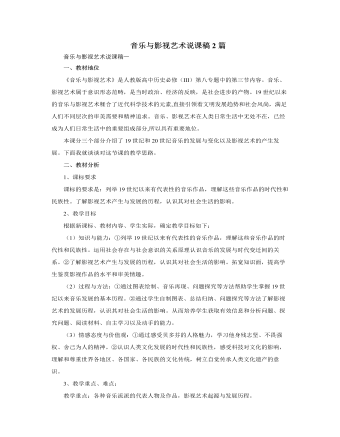
人教版高中历史必修3音乐与影视艺术说课稿2篇
一、教材地位《音乐与影视艺术》是人教版高中历史必修(III)第八专题中的第三节内容。音乐、影视艺术属于意识形态范畴,是当时政治、经济的反映,是社会进步的产物。19世纪以来的音乐与影视艺术糅合了近代科学技术的元素,直接引领着文明发展趋势和社会风尚,满足人们不同层次的审美需要和精神追求。音乐、影视艺术在人类日常生活中无处不在,已经成为人们日常生活中的重要组成部分,所以具有重要地位。本课分三个部分介绍了19世纪和20世纪音乐的发展与变化以及影视艺术的产生发展。下面我就谈谈对这节课的教学思路。二、教材分析1、课标要求课标的要求是:列举19世纪以来有代表性的音乐作品,理解这些音乐作品的时代性和民族性。了解影视艺术产生与发展的历程,认识其对社会生活的影响。2、教学目标根据新课标、教材内容、学生实际,确定教学目标如下:(1)知识与能力:①列举19世纪以来有代表性的音乐作品,理解这些音乐作品的时代性和民族性。
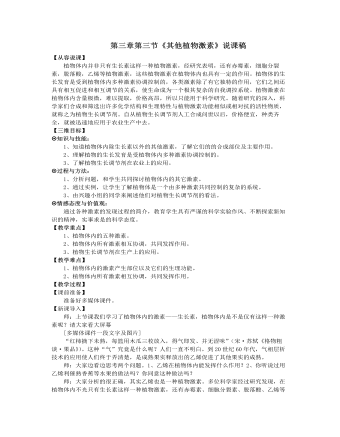
人教版高中生物必修3第三章第三节《其他植物激素》说课稿
二、应用生长调节剂的注意事项1、效果不稳定。2、使用时期。3、使用浓度和方法。4、使用生长调节剂仅是葡萄栽培管理的辅助手段,不能盲目孤立地依赖生长调节剂。生2:我们小组查的资料是关于小麦使用生长调节剂。小麦应用植物生长调节剂,可以调节植株的生长发育,具有控旺促壮、增强抗逆性、增加粒重、提高产量并有利于优质、早熟等多重效果。生3:我找了一篇生长调节剂对矮牵牛大型穴盘生产。师:上面三位同学利用课下的时间,在网上查的三段文字都相当的不错,大家可以从中学到一些书本上没有的知识,请大家结合刚刚三位同学的三段文字以及自己平时所积累的知识,讨论以下几个问题。师:你知道哪些农产品在生产过程中使用了植物生长调节剂?师:哪些水果在上市前有可能使用了乙烯利?师:生产过程中施用植物生长调节剂,会不会影响农产品的品质?师:如果你是水果销售员,面对半青不熟的水果,你认为应当使用乙烯利催熟吗?作为一个消费者,你又怎么看?
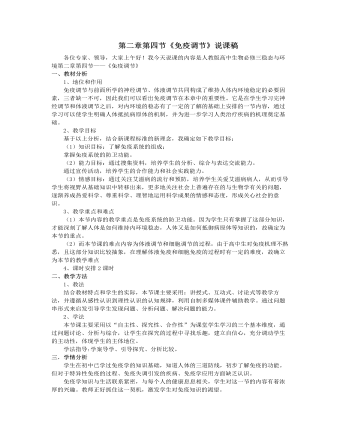
人教版高中生物必修3第二章第四节《免疫调节》说课稿
(四)、活动交流,体验科学通过资料分析讨论以下三个问题:1、你知道爱滋病的传播途径吗?2、如何预防爱滋病?3、我们应如何对待爱滋病患者?面对艾滋病我们能做些什么?从而进入情感态度的教育。除此之外,我还设计一个开放性的作业“向全社会为关注艾滋病设计一个宣传广告”(形式不限,漫画、板书、倡议书等),让学生把爱心付诸于实际行动。在此基础上引出“免疫学的应用”从免疫预防、免疫治疗、器官移植三个方面讲述,让学生充分体验到知识和社会生活的紧密联系,让他们不在感到科学是那么的遥远,而是可爱的有用的。通过交流,让同学们体会到合作的魅力和重要性,进一步培养合作意识和合作能力。最后我设计一个资料搜集,让同学们选一个感兴趣的主题利用电脑在网上搜集有关资料。主题:1、你知道世界艾滋病日吗?历年的主题是什么?开展世界艾滋病运动有什么意义?
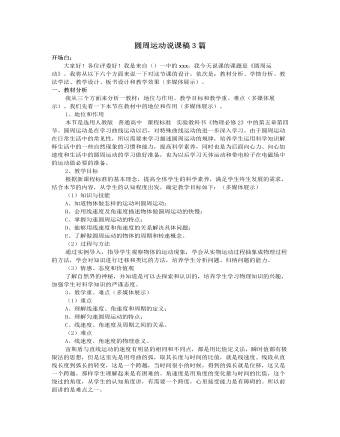
人教版新课标高中物理必修2圆周运动说课稿3篇
设计意图:通过设疑、讨论及学生的亲身体验与教师的引导,得到描述圆周运动快慢的两个物理量,也就成功的打破了学生在认识上的思维障碍,突破了物理概念教学的难点。在解决线速度和角速度的问题之后,我将引领学生学习匀速圆周运动的概念以及匀速圆周运动中线速度、角速度的特点。并引出匀速圆周运动中周期、转速的知识。为了加深学生对线速度、角速度与半径关系的认识,我设计了第三个学生体验活动:四名学生以我为圆心做圆周运动,四名学生始终并列,这时里圈同学走动不急不慢,而外圈同学则要小跑。通过学生的活动,不难发现在角速度相同的情况下,半径越大的线速度也越大。定性的得到了线速度、角速度与半径的关系。接下来让学生利用所学知识推导线速度、角速度与半径的关系。设计意图:这样就通过设疑、学生猜想、体验、推导的方式得到了结论,突破了本节课的难点即线速度、角速度与半径的关系。
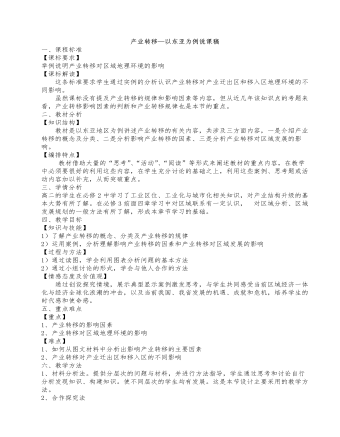
人教版高中地理必修3产业转移—以东亚为例说课稿
【情感态度及价值观】 通过创设探究情境,展示典型显示案例激发思考,与学生共同感受当前区域经济一体化与经济全球化浪潮的冲击,以及当前我国、我省发展的机遇、成就和危机,培养学生的时代感和使命感。五、重点难点【重点】1、产业转移的影响因素2、产业转移对区域地理环境的影响【难点】1、如何从图文材料中分析出影响产业转移的主要因素2、产业转移对产业迁出区和移入区的不同影响六、教学方法1、材料分析法。提供分层次的问题与材料,并进行方法指导,学生通过思考和讨论自行分析发现知识、构建知识。使不同层次的学生均有发展。这是本节设计主要采用的教学方法。2、合作探究法3、多媒体教学法七、 教学过程(一) 引入 :假如某同学买彩票中大奖,想投资生产面临几项选择1、投资高端智能手机制造还是普通服装厂?2、厂址选择在濮阳市还是南乐县?
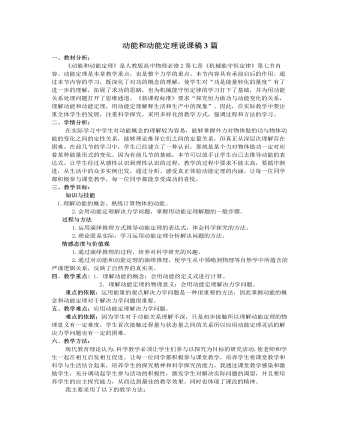
人教版新课标高中物理必修2动能和动能定理说课稿3篇
2、教学目标根据我对教材的理解、结合学生的实际情况、渗透新课程的教学理念,为提高全体学生的科学素养,按课程标准,以促进全体学生发展为目的。从知识与技能、过程与方法,情感态度与价值观三个方向培养学生,拟定三个教学目标:知识与技能:(1)知道什么是动能。(2)正确理解和运用动能公式分析、解答有关问题。(3)掌握外力对物体所做的总功的计算,理解“代数和”的含义。(4)理解和运用动能定理。过程与方法:通过演绎推理过程,培养科学研究兴趣,领略物理学中所蕴含的严谨的逻辑关系。情感、态度、价值观:通过运用动能定理分析解决问题,感受成功的喜悦,培养学生对科学研究的兴趣。3、教学的重点和难点重点:理解动能定理、应用动能定理解决力学问题。难点:应用动能定理解决多个过程的力学问题,以及变力做功或曲线运动中的动能定理运用。
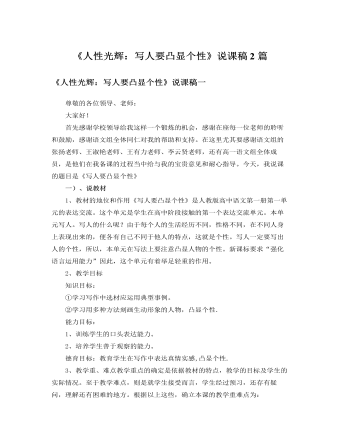
人教版高中语文必修1《人性光辉:写人要凸显个性》说课稿2篇
人教版新课标教材必修一的“表达交流”部分,有一个专题是“人性的光辉——写人要凸显个性”。其中的“写法借鉴”部分列举了两则人物描写实例,并归纳出人物描写的几个要点。其训练的思路和方法是很明显的,但所列举的人物描写的实例却不够典型。而必修一第三单元正好是学习写人记事散文,其中的两篇自读课文《记梁任公先生的一次演讲》《金岳霖先生》又是写人记事非常典型的文章,故而我尝试将这两篇文章作为实例和。写人要凸显个性。写作指导结合起来教学。这样设计还有一个目的,那就是解决课程改革中教学内容多而课时紧张的矛盾,提高课堂教学效率。师:今天,我们一起来学习“写人要凸显个性”。这两堂课分四个步骤来完成:一、先学习教材中关于写人方法的介绍,约15分钟;二、快速阅读第三单元的《记梁任公先生的一次演讲》和《金岳霖先生》两篇文章,具体感受其写人的方法,约30分钟;
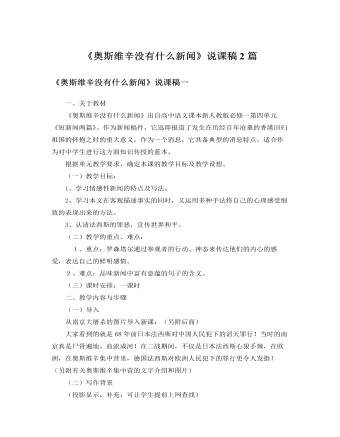
人教版高中语文必修1《奥斯维辛没有什么新闻》说课稿2篇
第11段很短,只点出了这是“在妇女身上搞不育试验的地方”,但在最末又加了一句“否则他会羞红了脸的”,这是为什么?那肯定是一个极为肮脏,极为残酷的地方。据资料记载:当时的希特勒制定一项令所有被征服或占领国家的民族充当奴隶并且逐渐消亡的隐密性种族灭绝计划——高效率、大规模的强制绝育。为此,数以百计的纳粹医生、教授、专家甚至护士,在行政管理专家的通力合作下,相继提出了几十种绝育方法,十余种实施方案,并且在奥斯维辛、拉芬斯布吕克、布亨瓦尔特、达豪等十多个大型集中营内对数以万计的犹太、吉普赛囚犯、因从事抵抗运动而被捕的政治犯和男女战俘进行了残酷的手术试验,造成他们大量死亡或者终身残疾、终身不育。这样残酷的毫无人性的手段,任谁也不愿看到。
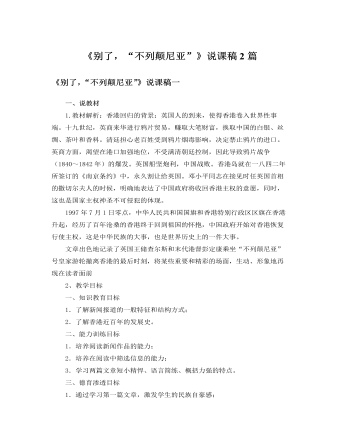
人教版高中语文必修1《别了,“不列颠尼亚”》说课稿2篇
一、说教材《别了,不列颠尼亚》是编排在人教版《普通高中课程标准实验教科书语文1(必修)》第四单元的课文,是精读课文《短新闻两篇》中的一篇,另一篇是《奥斯维辛没有什么新闻》。这一单元的学习内容是新闻和报告文学,还有两篇作品分别是中国报告文学三大里程碑之一的《包身工》和记录中国航天事业辉煌发展的《飞向太空的航程》。在当今信息大爆炸的时代,如何快速获得信息,如何在新闻中解读事件的真相,感悟生活的内涵成为语文教学的又一重大任务。因此这一单元的编入便更多地具有了时代意义,体现了语文学科与日常生活的密切关系。不仅如此,新闻特写和报告文学的选入,拓宽了学生对新闻类文章的了解,体现语文学科的工具性作用。在选文的过程中,新教材同时注重语文学科的人文性,四篇作品不仅传递着新鲜、真实的信息,同时更张显人文性的厚度,他们以饱满的情感,纵横的历史经验。
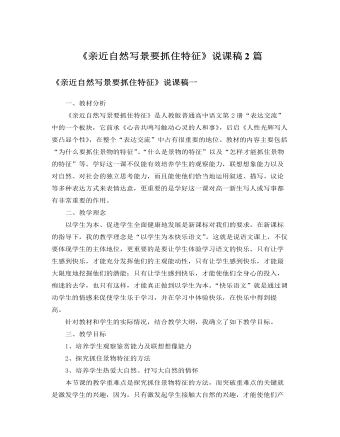
人教版高中语文必修2《亲近自然写景要抓住特征》说课稿2篇
我选取这两组例子的目的就是要学生在阅读对比中明白“横看成岭侧成峰。远近高低各不同”的道理。要让学生明白:看同一景物,观者所处的方位不同,角度不同,收到的效果也不同。最后教师明确:要写出景物的特征,首先得仔细观察,并注意观察点的变化。然后追问:抓住景物的特征还有哪些要求?让学生带着问题再来看多媒体出示的夜晚荷塘图和泰山松的有关图片,先让学生尝试描写,然后再出示《荷塘月色》和《雨中登泰山》中和图片有关的两段描写。这两段分别是:“曲曲折折的荷塘上面,弥望的是田田的叶子……仿佛远处高楼上渺茫的歌声似的。”(《荷塘月色》),“但是把人的心灵带到一种崇高境界的,是那些“吸翠霞而夭矫的松树……都让你觉得他们是泰山的天然主人,好象少了谁都不应该似的。”(《雨中登泰山》)。
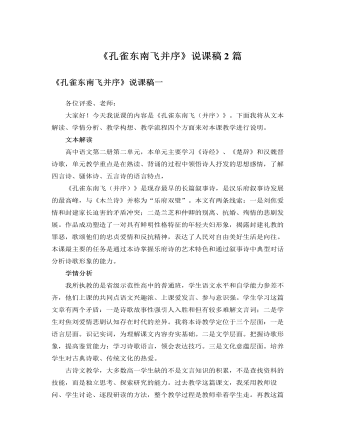
人教版高中语文必修2《孔雀东南飞并序》说课稿2篇
4、问题策略。引导学生提出问题、提出有价值的问题,是探究性学习的难点,也是课堂教学最有活力、最具创造力的亮点。我设计的课堂问题有:诗歌着力赞颂刘焦坚贞爱情和反抗精神,但他们许多地方却表现的非常顺从呢?焦母如此专横固执,为什么在焦刘悲剧发生后又要求合葬呢?这些由诗句生发的问题,会深深打动作学生的心灵,诱导学生去读诗,去背诗,去体味诗。5、手段方法。借助多媒体课件10个幻灯片、课文音频诵读资料、课文相关的文字资料,采用诵读法、讨论法、探究法等教学方法进行本课教学。6、板书设计:板书是教学内容的浓缩。根据教学重点和本诗特色,我的板书分预设和生成两块。预设板书设计有文章标题、情节结构、艺术特色三部分。文章标题孔雀东南飞情节结构被遣——誓别——抗婚——殉情——化鸟艺术手法①人物对话的个性化②铺陈排比的手法③起兴和尾声